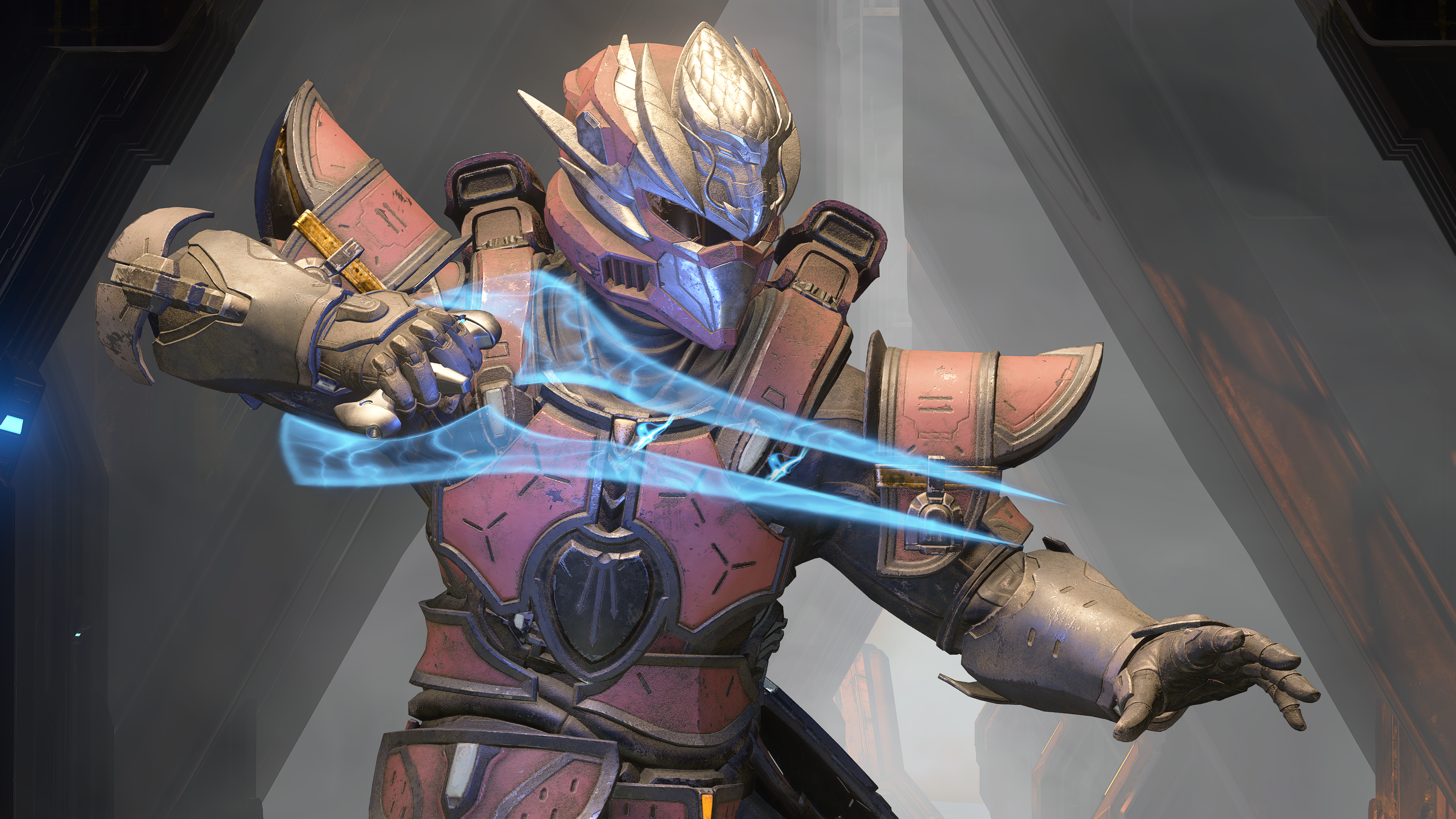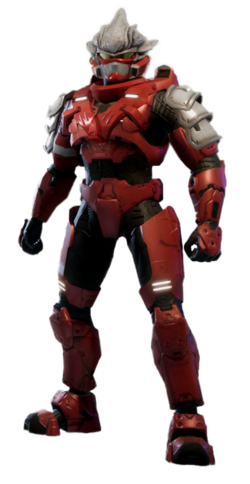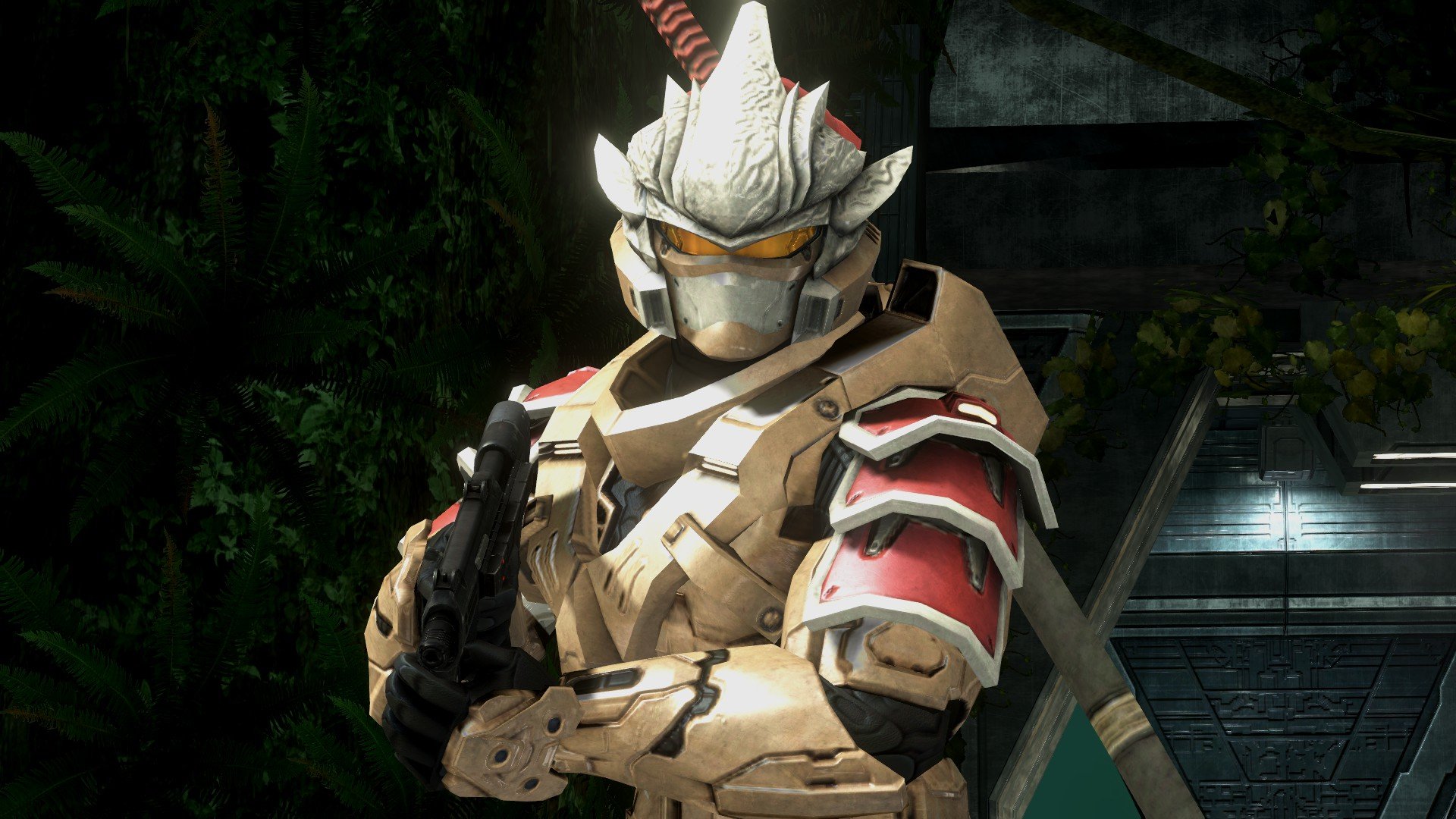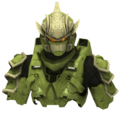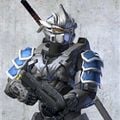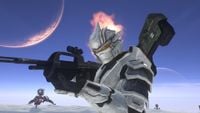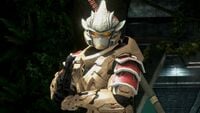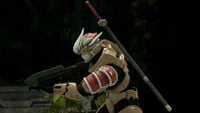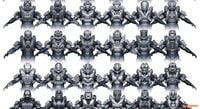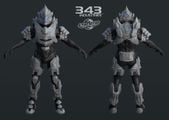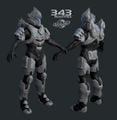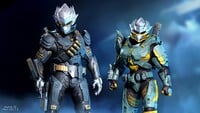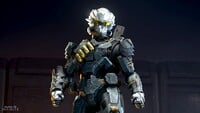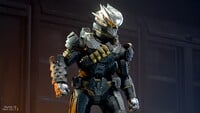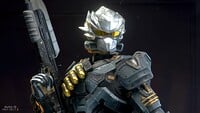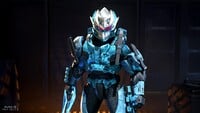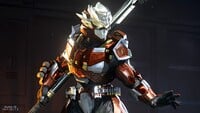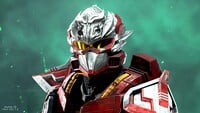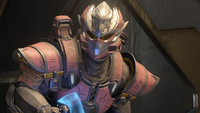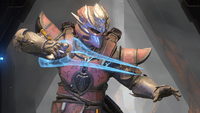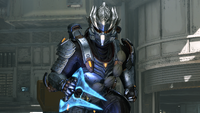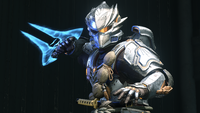Project HAYABUSA
From Halopedia, the Halo wiki
| Hayabusa | |
|---|---|
| Production overview | |
|
Manufacturer(s): |
|
|
Type: |
|
|
Role(s): |
Heavy lifting and extra-vehicular activity |
Project HAYABUSA is a UNSC powered armor program developed independently from, and as a rival to Project MJOLNIR. The program later produced a MJOLNIR variant for the Mark VI platform[2] alongside MJOLNIR Powered Assault Armor (GEN3).[3]
GEN1 overview[edit]
Design details[edit]
The Hayabusa armor's advanced materials decreased its weight by nearly one-third,[1] and was aesthetically designed after ancient Japanese samurai armor. It includes spiked shoulder pauldrons similar to traditional Japanese sode designs.
The Hayabusa armor's helmet was designed with a defensive and ultraviolet-protective visor. Like all UNSC helmets, the visor is the weakest part. Thus, a small visor was designed to be more difficult to accurately penetrate. As such, the small visor provides for better protection of the wearer as well as better camouflage. The Hayabusa was designed with greater emphasis on heavy lifting and extra-vehicular activity than the MJOLNIR. It is slightly slower and less dexterous than its MJOLNIR counterpart, though it is nonetheless highly effective and possesses most of the design features of the MJOLNIR Mark VI.[4]
Development history[edit]
The Hayabusa is a powered battle armor system, similar to the MJOLNIR armor, except stemming from Project HAYABUSA as opposed to Project MJOLNIR. It was developed by the RKD Group, an Earth-based think tank, in the year 2536, fifteen years before the MJOLNIR Mark V entered production. It was presented to the UNSC Ordnance Committee as an answer to the self-contained powered armor problem.[1]
Originally, RKD developed Project HAYABUSA without knowledge of the classified Project MJOLNIR. After contacts were made between RKD and the Office of Naval Intelligence's Materials Group, the two pooled their research resources, resulting in the creation of a MJOLNIR-compatible HAYABUSA variant. Featuring a number of stylistic and functional improvements, it became a crucial piece of hardware in the later years of the Human-Covenant War.[2]
GEN3 overview[edit]
Design details[edit]
 This section is a stub. You can help Halopedia by expanding it.
This section is a stub. You can help Halopedia by expanding it.
In-game information[edit]
Halo 3[edit]
The Hayabusa armor permutation is a special unlock in Halo 3, and can be fully obtained by finding every skull hidden within the game's campaign. Halo: The Master Chief Collection would have the Hayabusa armor, along with every other base set in Halo 3 unlocked by default.
| Helmet | Description | Unlock requirements (Halo 3) | Unlock requirements (Halo: MCC) |
|---|---|---|---|
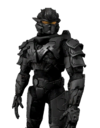 Hayabusa |
Helmet description (H3): The critical innovation brought about by RKD's involvement in the development of power armor is in the use of advanced materials-reducing the weight of current generation armor by nearly a third. | Obtain all thirteen skulls. | Unlocked by default. |
| Shoulder description (H3): Although the two projects were developed wholly independent of one another, projects HAYABUSA and MJOLNIR mirrored each other in many ways. | Obtain nine skulls | ||
| Chest description (H3): In late 2536, RKD -an Earth-based think tank- presented the UNSC Ordnance Committee with the answer to the self-contained powered armor problem: Project HAYABUSA. | Obtain five skulls | ||
| Description (MCC): While wholly independent of one another, projects HAYABUSA and MJOLNIR mirrored each other in many ways. | N/A |
Halo Infinite[edit]
Hayabusa returned in Halo Infinite as part of the Legacy Operation. It could be acquired as part of the Hayabusa Zokuhen bundle in the Exchange during the Legacy Operation in June of 2025,[3] with a second and final drop occurring during the Warpath Operation in September.[5] Unlike its Halo 3 or intended Halo 4 counterparts, the Hayabusa variant featured within Infinite is only a helmet, without any accompanying shoulder or chest armor.
| Armor | Manufacturer | Lore | Rarity | Introduced In | Unlock Requirements |
|---|---|---|---|---|---|
Hayabusa |
RKD Group | RKD continues to press forward with its "Yaiba" assault body suit initiative, with technological innovations adapted to sustaining its Project HAYABUSA in collaboration with Materials Group. Unlike traditional active jamming and Forerunner-derived stealth systems requiring significant power draw, HAYABUSA utilizes lightweight, AI-formulated metamaterial surface treatments and specialized geometry to naturally diffuse and distort electromagnetic signatures. These technologies, refined through years of covert weapons testing and battle analysis, have resulted in minimal sensor signature without compromising traditional defensive capabilities. | Legendary | Legacy | Purchase "HAYABUSA ZOKUHEN" Bundle from The Exchange for |
Sigma Dragon |
Projects HAYABUSA and MJOLNIR were conceived wholly independently of each other to solve a common problem: the creation of self-contained powered armor suitable for use by augmented warfighters. However, the two projects mirror each other, with the UNSC Ordnance Committee eventually requiring many components be cross-compatible. The stealth and stylistic features of HAYABUSA remain a key technical and marketing differentiator, as demonstrated with the Sigma Dragon reconnaissance module, which provides a range of cutting-edge reconnaissance and surveillance functionality with minimal impact on the suit's emission profile. |
Production notes[edit]

|
Browse more images in this article's gallery page. |
The Hayabusa armor bears a resemblance to the armor worn by feudal-era samurai. The armor is named after Ryu Hayabusa, the protagonist of the Ninja Gaiden series and a combatant in the Dead or Alive series. The helmet is almost an exact copy of the "ninja of the future" costume in Ninja Gaiden on the Xbox. Bungie likely created the Hayabusa armor as a tribute to Team Ninja for adding Nicole-458 into Dead or Alive 4. Team Ninja, the developers of the Ninja Gaiden and Dead or Alive series, are mentioned in the credits for Halo 3.
The Hayabusa armor was at some point intended for inclusion in Halo 4's multiplayer component. Concept art was created for a [GEN2] iteration of the armor by artist Gabo Garza.[6] A high-poly model of this armour was later created by 3D artist Ashish Parashar at Liquid Development, a studio which assisted in the creation of Halo 4's multiplayer armour sets. However, this version of Hayabusa has never been seen implemented within the game engine, and was not present in the final game.[7] The Shinobi armor developed for Halo 5: Guardians was designed as a spiritual successor to Hayabusa.[8]
Gallery[edit]
Halo 3[edit]
Hayabusa with katana. Available upon unlocking 49 of 79 achievements.
A flaming Hayabusa helmet, triggered by the Bungie employee-only chest plate.
Halo 4[edit]
Halo Infinite[edit]
List of appearances[edit]
- Halo 3 (First appearance)
- Halo 4 (Cut content)
- Halo Infinite
Sources[edit]
- ^ a b c Halo 3, Spartan Armor Customization: HAYABUSA Description
- ^ a b Halo Encyclopedia (2011 edition), page 96
- ^ a b X.com, Halo (@Halo): "The legendary Dragon Ninja returns 🐉Get ready to earn the Hayabusa helmet in the HAYABUSA ZOKUHEN bundle available in The Exchange starting tomorrow through July 8. #OperationLegacy arrives June 10!" (Retrieved on Jun 9, 2025) [archive]
- ^ Halo Encyclopedia (2009 edition), page 93
- ^ X.com, Brian Jarrard (@ske7ch): "PSA: We can confirm the Hayabusa helmet will be back in the Exchange for ONE FINAL RUN during the #HaloInfinite September Operation. Start saving your Spartan Points!" (Retrieved on Jul 25, 2025) [archive]
- ^ ArtStation, SPARTANS MP, Gabo Garza (Retrieved on Apr 27, 2021) [archive]
- ^ ArtStation, Hayabusa Halo 4: "Hayabusa Hires Model for Halo4 Game" (Retrieved on Mar 12, 2025) [archive]
- ^ Halo Waypoint, Community Update - Prepare for (Big Team) Battle (Retrieved on Oct 30, 2021) [archive]
| ||||||||||||||||||||||||||||||||||||||||||||||||||||||||||||||||||
| |||||||||||||||||||||||||||||||||||||||||||||||||||||||||||||||||||
